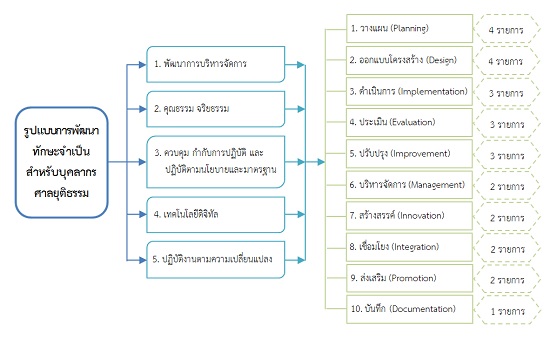SKILL DEVELOPMENT FOR COURT OF JUSTICE PERSONNEL
DOI:
https://doi.org/10.14456/nrru-rdi.2023.57Keywords:
Personnel development, Personnel skill, Court of justice personnelAbstract
Developing skill for personnel is a necessary process that must be carefully attended to and improvement to align with organization goals, continuously. This mixed-methods research aimed to: 1) investigate problems and obstacles in skill development, 2) study current skills, expected skills, and the format of skill development, and 3) propose skill development guidelines for court of justice personnel. A group of 16 informants and a sample of 510 participants were determined using the purposive and voluntary sampling methods. The instruments used were interviews and questionnaires with a consistency index of 0.84 and 0.89, respectively. Data were collected using in-depth interviews and online transferring. Content analysis and statistical measures were used for data analysis, including mean values, the needs index, and and create illustrations for lectures. The findings indicated that 1) The personnel lack position-specific skill development, and the developed skills are inconsistent with job descriptions. 2) The current skills are at a moderate level, while the expected skills are at the highest level. The needs for skills development are management, ethics, control, policy compliance, digital technology, and adaptability which are following by 10 elements and 26 items of developed for use in management. And 3) key guidelines include adapting the important skill development models to each skill in order to achieve management, creating a culture change of growth mindset, working productivity, and staying informed with the times. The results contribute to make the organization have continuous development human resources of valuable.
References
Blair, G., Woodcock, H., & Pagano, R. (2023). Skills Development in a Volatile Environment: A Systems View of the Learning Process. Apex Journal of Business and Management (AJBM), 1(1), 21-32. http://doi.org/10.61274/apxc.2023.v01i01.003
Creswell, J. W. (2003). Research Design: Qualitative, Quantitative, and Mixed Methods Approaches. Thousand Oaks, CA : Sage.
Cronbach. L. J. (1970). Test Validation. Chapter 14. In R. L. Thorndike (Ed.) Educational Measurement (2nd ed). Washington D.C. : American Council on Education.
Davis, K. (1990). Effective Business Psychology. New Jersey : Prentice-Hall.
Desimone, R. L., Werner, J. M., & Harris, W. D. (2002). Human resource development (3rd ed.). Fort Worth : Harcourt College Publishers.
Dongdang, J. (2019). The Effectiveness of Self-Development of Judicial Service Officers of the Administrative Office of the Court of Justice, Region IV. An Independent Study, Master of Public Administration Program in School of Management Science, Sukhothai Thammathirat Open University, Nonthaburi. (In Thai)
Drak, T. L., & Roe, W. H. (1986). The principal ship. New York : Macmillan.
Griffin, R. (1984). Management (5th ed.). Boston : Mifflin.
Harris, B. M. (1985). Superviosory Behavior in Education (2nd ed.). Englewood Cliffs, N. J. : Prentice-Hall.
Jabber, M. A., Sakib, M. N., & Rahman, M. M. (2023). Exploring the roles and challenges of the servant leadership: A critical examination of the Bangladesh police. Heliyon, 9(1). https://doi.org /10.1016/j.heliyon.2022.e12782
K01. (2022, 1 May). Key informant. Interview. (In Thai)
K02. (2022, 1 May). Key informant. Interview. (In Thai)
K06. (2022, 8 May). Key informant. Interview. (In Thai)
K07. (2022, 8 May). Key informant. Interview. (In Thai)
K08. (2022, 8 May). Key informant. Interview. (In Thai)
K010. (2022, 22 May). Key informant. Interview. (In Thai)
K011. (2022, 22 May). Key informant. Interview. (In Thai)
Kaliannan, M., Darmalinggam, D., Dorasamy, M., & Abraham, M. (2023). Inclusive talent development as a key talent management approach: A systematic literature review. Human Resource Management Review, 33(1), 100926. https://doi.org/10.1016/j.hrmr.2022.100926
Kamket, W. (2012). Research methods in behavioral science (3rd ed.). Bangkok : Chulalongkorn University Press. (In Thai)
Kanchanawasi, S. (2007). Evaluation Theory (6th ed.). Bangkok : Chulalongkorn University Press. (In Thai)
Killian, R. A. (1965). Human resource management. New York : Mc Graw-Hill.
Office of the Civil Service Commission. (2020). Guidelines for the development of public sector personnel 2020-2022. Bangkok : Office of the Civil Service Commission. (In Thai)
Office of the Commission for Judicial Serivce. (2020). Digital skills development plan for judiciary personnel 2020-2021. Bangkok : Office Of The Judiciary. (In Thai)
Office Of The Judiciary. (2018). Strategic Plan of the Court of Justice B.E. 2561-2564. Bangkok : Office Of The Judiciary. (In Thai)
Office Of The Judiciary. (2020). Digital Court of Justice Development Plan 2019-2021. Bangkok : Information and Public Relations Division, Office Of The Judiciary. (In Thai)
Office of the Public Sector Development Commission. (2018). Improving the quality of public sector management. Bangkok : Office of the Public Sector Development Commission. (In Thai)
Phetsombat, P. (2018). Educational Administration Research. Bangkok : Triple Education. (In Thai)
Polo, F., & Kantola, J. (2019). Valorazing the Human Capitals within Organization: A Competency Based Approach. Advances in Human Factors, Business Management and Society Journal. doi:https://doi.org/10.1007/978-3-319-94709-9_6
Prasitratsin, S. (2011). Social science research methods (12th ed.). Bangkok : Samlada. (In Thai)
Prasitratsin, S. (2013). Using statistics in research correctly and according to international standards (6th ed.). Bangkok : Samlada. (In Thai)
Putri, M. R., Hidayah, Z., & Maharani, A. (2023). Perspectives to Strengthening Competencies of Judges in The Supreme Court of The Republic of Indonesia. Jurnal Manajemen (Edisi Elektronik), 14(2), 220–239. https://doi.org/10.32832/jm-uika.v14i2.11228
Ríos, M. C. (2023). Policy analysis in the bureaucracy: the production of knowledge for professional public management training. In Policy Analysis in Argentina (pp. 105-118). Policy Press. https://doi.org/10.51952/9781447364924.ch007
Sergiovanni, T. J., & Moore, J. H. (1983). Schooling for tomorrow dancing reforms to Issue that count. Boston : Allyn and Bacon.
Suny, K., & Yajurvedi, N. (2022). Enhancing the Efficacy of Organizational Competitive Advantage Through Employee Empowerment. Journal of Positive School Pyschology, 6(3), 5457-5465.
Tirakanun, S. (2006). Using statistics in social science research: guidelines for practice (2nd ed.). Bangkok : Chulalongkorn University. (In Thai)
Witkin, B. R., Altschuld, J. W., & Altschuld, J. (1995). Planning and conducting needs assessments: A practical guide. New York : Sage.
Wongwanich, S. (2019). Research to assess needs is necessary. Bangkok : Chulalongkorn University Press. (In Thai)

Downloads
Published
How to Cite
Issue
Section
License

This work is licensed under a Creative Commons Attribution-NonCommercial-NoDerivatives 4.0 International License.




